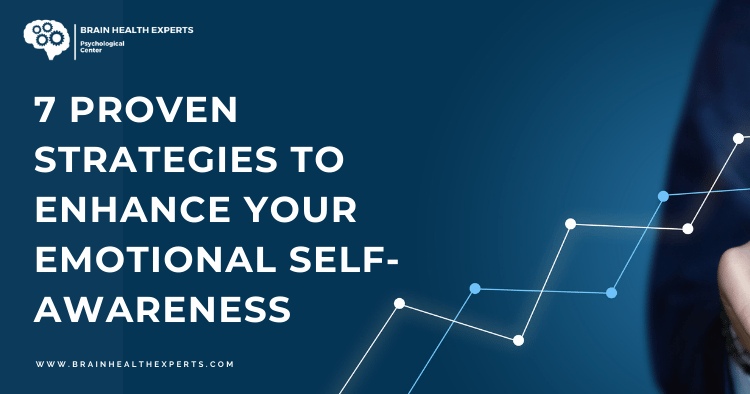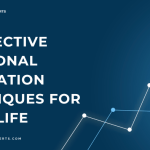Table of Contents
- Understanding Emotional Self-Awareness
- Practice Mindfulness Meditation
- Keep a Daily Journal
- Identify Your Emotions
- Seek Feedback from Others
- Develop Empathy
- Set Aside Time for Reflection
Understanding Emotional Self-Awareness
Emotional self-awareness is the ability to recognize and understand your own emotions, as well as their impact on your thoughts and behavior. Research has shown that higher emotional self-awareness leads to better decision-making, improved relationships, and enhanced emotional regulation. It’s a foundational skill for personal development and emotional intelligence.
According to the Greater Good Science Center, those who are emotionally self-aware can navigate their emotional landscapes more effectively, leading to healthier interactions and a more fulfilling life.
Furthermore, studies from 2024 emphasize the increasing importance of emotional self-awareness in workplace settings, where leaders with high emotional intelligence foster better team dynamics and productivity.
Practice Mindfulness Meditation
Mindfulness meditation is a powerful tool for enhancing emotional self-awareness. By focusing on the present moment without judgment, you can cultivate a deeper understanding of your thoughts and feelings. Here’s how to get started:
- Find a Quiet Space: Choose a place where you won’t be disturbed.
- Set a Timer: Begin with 5-10 minutes and gradually increase as you become more comfortable.
- Focus on Your Breath: Pay attention to the rhythm of your breathing. When your mind wanders (and it will), gently bring your focus back to your breath.
- Observe Your Thoughts: Instead of engaging with or judging your thoughts, simply observe them as they come and go.
The practice of mindfulness helps you become aware of your emotional responses in real-time, allowing you to respond thoughtfully rather than react impulsively.
For additional techniques on cultivating a positive mindset through mindfulness, check out 10 Powerful Techniques to Cultivate Positive Mindset.
Keep a Daily Journal
Journaling can be an effective way to enhance emotional self-awareness. By writing about your thoughts and feelings, you can gain insights into your emotional triggers and patterns. Here are some tips to make the most of your journaling practice:
- Set a Regular Time: Choose a time each day to reflect and write, whether in the morning or before bed.
- Use Prompts: Start with prompts like “Today I felt…” or “I noticed I was triggered by…”. This can help you focus your thoughts.
- Review Your Entries: At the end of the week, take some time to review what you’ve written. Look for recurring themes or emotions.
Keeping a journal not only provides a space to express your feelings but also helps you track your emotional growth over time.
This practice aligns with the insights shared in 10 Tips to Overcome Negative Thought Patterns Today.
Identify Your Emotions
Being able to identify and label your emotions is crucial for emotional self-awareness. Try the following strategies to enhance this skill:
- Utilize an Emotions Wheel: An emotions wheel can help you expand your emotional vocabulary. It categorizes emotions into primary and secondary feelings, allowing you to pinpoint what you’re experiencing more accurately.
| Primary Emotion | Related Emotions |
|---|---|
| Joy | Happiness, Excitement |
| Sadness | Grief, Disappointment |
| Anger | Frustration, Irritation |
| Fear | Anxiety, Worry |
- Practice Naming Emotions: Throughout your day, take a moment to pause and ask yourself, “What emotion am I feeling right now?” This practice builds your emotional vocabulary and helps you articulate your feelings more clearly.
Additionally, understanding how emotional self-awareness boosts emotional well-being can be seen in the article 10 Ways Positive Thinking Boosts Emotional Well-Being.
Seek Feedback from Others
Sometimes, we may not see ourselves as clearly as others do. Seeking constructive feedback from trusted friends, family members, or colleagues can provide valuable insights into your emotional behaviors. Here’s how to approach this:
- Choose the Right People: Select individuals who know you well and who will provide honest, compassionate feedback.
- Ask Specific Questions: Instead of general queries, ask specific questions like, “How do you think I handle stress?” or “What do you notice about my emotional responses in certain situations?”
- Listen Actively: When receiving feedback, practice active listening. Avoid becoming defensive; instead, focus on understanding their perspective.
This exercise not only builds your emotional self-awareness but also strengthens your relationships through open communication.
For further insights on managing stress and enhancing relationships, refer to 10 Ways to Manage Stress for Healthier Relationships.
Develop Empathy
Empathy is the ability to understand and share the feelings of others, and it is closely linked to emotional self-awareness. Here are some strategies to cultivate empathy:
- Practice Active Listening: When someone is speaking, focus fully on their words. Avoid thinking about your response while they’re talking, and instead, maintain eye contact and nod to show you’re engaged.
- Put Yourself in Their Shoes: Try to imagine how the other person feels in their situation. Ask yourself questions like, “What would I feel if I were in their position?”
- Reflect on Your Emotions: Consider how your own emotions may impact your understanding of others. By recognizing your feelings, you can better appreciate the emotions of those around you.
Empathy not only helps you connect with others but also enables you to better understand your emotional reactions in social contexts.
This is essential for fostering positive relationships, as outlined in 10 Ways Positive Thinking Transforms Your Relationships.
Set Aside Time for Reflection
Taking time to reflect on your experiences and emotions is vital for enhancing self-awareness. Here are some strategies to help you integrate reflection into your routine:
- Create a Reflection Ritual: Set aside a specific time each week to reflect on your emotions, experiences, and interactions. This could be through journaling, meditation, or simply quiet contemplation.
- Ask Reflective Questions: Use guiding questions such as “What emotions did I experience this week?” or “How did my emotions influence my decisions?”
- Look for Patterns: As you reflect, look for patterns in your emotions and behaviors. Are there specific situations where you consistently feel a certain way? Understanding these patterns can lead to profound insights.
Reflection is a critical component of emotional growth, enabling you to learn from your experiences and adjust your responses moving forward.
This practice can also be enhanced through gratitude, as described in 10 Simple Gratitude Practices to Boost Positive Thinking.
FAQs
Q: Why is emotional self-awareness important?
A: Emotional self-awareness is crucial because it helps you understand your emotions, improves your communication skills, enhances your relationships, and fosters better decision-making.
Q: How long does it take to improve emotional self-awareness?
A: Improving emotional self-awareness is a lifelong journey. However, with consistent practice and dedication, you can see noticeable improvements within a few weeks.
Q: Can emotional self-awareness be learned?
A: Yes, emotional self-awareness can be developed through practices such as mindfulness, journaling, and seeking feedback.
By implementing these seven strategies, you can significantly enhance your emotional self-awareness, leading to a more fulfilling and emotionally intelligent life.
Remember, the journey toward self-awareness is ongoing, so be patient and compassionate with yourself as you grow. Happy exploring!





